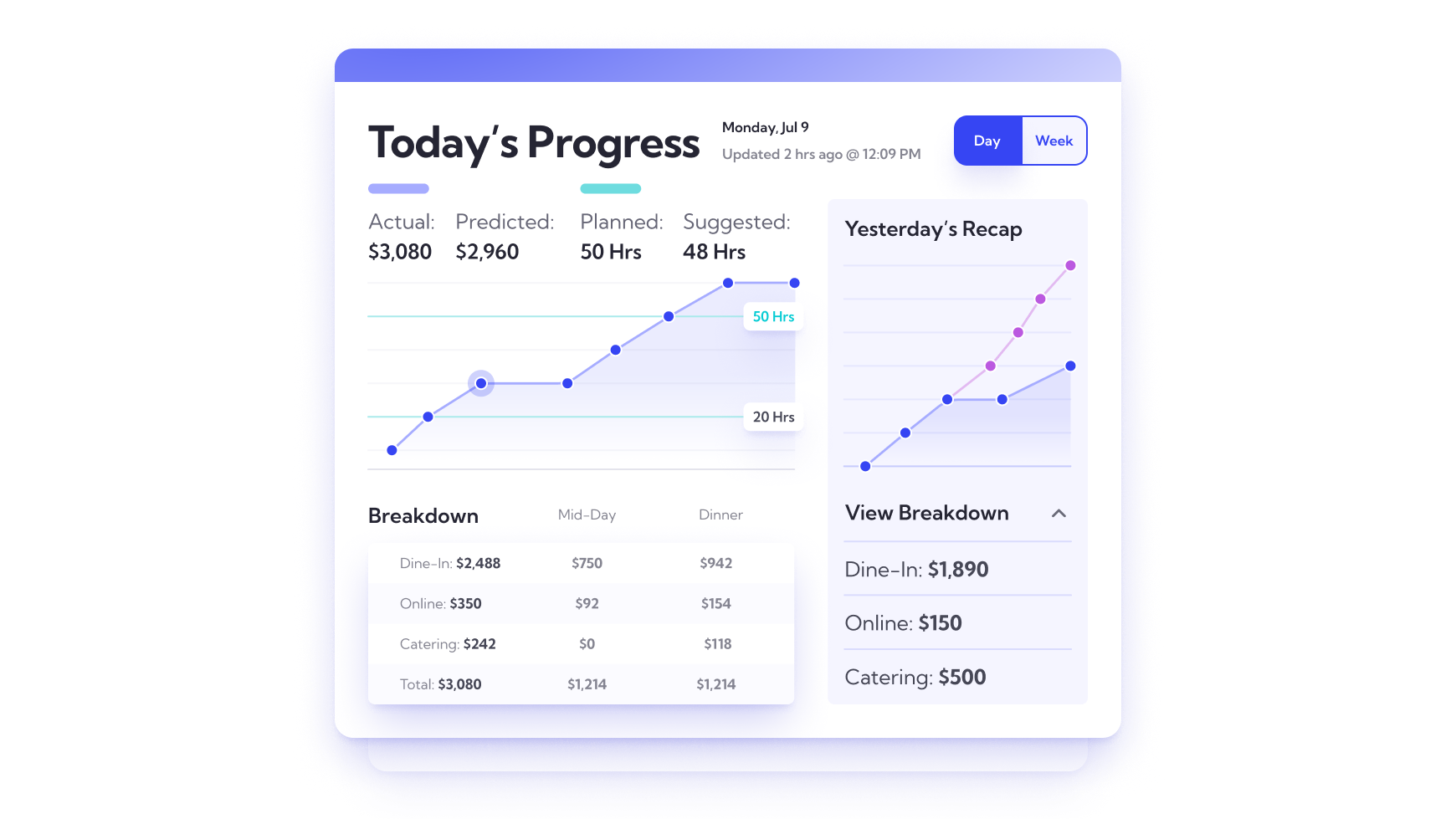Managing a restaurant is a high-stakes role that demands much more than just overseeing a venue; it's about leading a team through high-pressure situations every day. Your decisions and leadership significantly influencing the venue's success or failure.
Notably, industry statistics reveal that only about 20% of restaurants survive past their first five years. This daunting statistic underscores the critical nature of effective management.
Since the pandemic, the challenge of hiring and retaining staff has intensified, contributing significantly to the stress and demands of the job. The ongoing restaurant labor shortage has transformed staffing from a routine management duty into a crucial strategic endeavor, essential for maintaining operations and driving success.
This comprehensive guide will provide you with essential tips and strategies for effective and efficient restaurant management.
1. Hire and Train the Right Staff For the Job
At the heart of every successful restaurant is a team of dedicated, skilled, and passionate staff. In light of the current labor shortage, hiring the right people has become more crucial than ever, as it sets the tone for the restaurant's culture, efficiency, and overall service quality.
Invest one-on-one time and effort in the recruitment and selection process, making sure that you hire individuals who are not only competent but also share the restaurant’s mission and values. You can do this by tailoring your interview questions to reveal not just their skill set, but their attitude and approach to work. For instance, ask about their most memorable customer service experience or how they might handle pressure during peak hours.
Once you have assembled your team, remember that learning is a continuous process. New hires need some time to pick things up. Regular training and development sessions should be part of your operational calendar. These sessions can range from improving culinary skills to enhancing customer service. By doing so, you ensure that your team is always equipped with the latest industry knowledge and can meet the evolving demands of your customers.
Finally, remember that your staff is your greatest asset. Make it a point to recognize their efforts, listen to their ideas, and encourage their growth. This could be as simple as offering a platform for them to share their insights after each service or as elaborate as setting up a reward system for exceptional performance. By doing so, you're not only motivating your team but also fostering a sense of ownership and commitment to the restaurant's success.

2. Prioritize High-Quality Customer Service
Customer satisfaction is a cornerstone of any successful restaurant and has a profound impact on your restaurant’s bottom line. Seventy percent of U.S. restaurant-goers indicate that they've paid extra to dine at establishments known for providing exceptional service.
To achieve high levels of satisfaction, prioritize customer service in every aspect of your operations. This goes beyond just serving great food. It encompasses every interaction a customer has with your restaurant, from the moment they walk through your doors to the time they leave.
Firstly, instill in your team the importance of delivering top-notch service with a personal touch. This can be achieved by training your staff to not just meet but exceed customer expectations. For instance, encourage them to memorize regular customers' names or favorite orders. This kind of personalized service can make customers feel valued and welcomed, fostering loyalty.
Secondly, reinforce the significance of prompt and attentive service. Speed is crucial in the restaurant business, but it should never come at the cost of quality. One way to achieve this balance is by running regular scenario-based training sessions. These could involve dealing with a rush of customers or handling a complicated order. This prepares your team to handle real-world challenges while maintaining the highest level of service.
Lastly, ensure your team understands that friendliness is non-negotiable. A warm greeting, a genuine smile, and a pleasant conversation can turn a one-time visitor into a regular. Foster an environment that values kindness and positivity, and it will naturally reflect in your team's interactions with your customers.
Learn how to develop an effective communication plan in your restaurant.
3. Maintain Food Consistency
Ensuring consistency in food and beverages is paramount in the restaurant industry. If somebody has a bad experience even once, it can start showing up in your online reviews. Sixty percent of diners in the U.S. prioritize reading reviews before heading out for a meal, surpassing the importance of finding directions to a restaurant or browsing food photos. You need to maintain consistent quality as part of your restaurant’s brand. To achieve this, focus on three main aspects.
First, implement rigorous quality control for your ingredients. Collaborate with your suppliers to maintain high-quality standards, which might include routine ingredient testing or regular visits to supplier facilities.
Second, uphold optimal storage conditions in your kitchen. Train your team on proper food storage techniques and regularly inspect your storage areas to ensure they meet required standards. Make sure all new employees receive the same training.
Lastly, adhere strictly to standardized recipes for your signature dishes. Regularly conduct training and random taste tests to maintain consistency in flavor and presentation.
By maintaining these standards, you'll deliver the consistent quality that your customers expect, fostering loyalty and enhancing your restaurant's reputation.
4. Communicate Effectively With Staff
Communication is the lifeline of any successful restaurant. Foster an environment where open and effective communication is encouraged. Everyone, from the kitchen staff to the servers, should understand their roles and responsibilities and how they fit into the overall operations.
Managing a busy restaurant can be quite challenging. However, with good organization and time management, you can handle high-pressure situations smoothly. Make sure that every process, from taking orders to serving food, is efficient. During rush hours, effective internal communication among restaurant staff becomes even more critical. While it’s not necessarily a manager’s job to be in a good mood all the time, and let’s face it, you’re human, a positive attitude is contagious.
5. Utilize Technology
Technology is constantly reshaping the way we do things and the restaurant industry is no exception. From POS (point-of-sale) systems to staffing solutions and employee scheduling tools, sometimes being a good restaurant manager comes down to arming yourself with the right tools to help you get the job done. It's worth noting that over 40% of restaurant operators are recognizing this shift towards digital enhancement and are planning to invest in new equipment and technology to boost productivity in both customer-facing and operational aspects.
For example, forecasting and scheduling can take a lot of managerial time. Finding solutions that can automate those tasks means less time in the back office and more time out front helping employees and interacting with customers.
That’s our focus at Lineup.ai. We aim to help managers streamline their restaurant operations using AI-driven sales, labor, and item-level forecasting.
Remember, not all technology solutions are created equal. You need to conduct a fair amount of research before making any decisions. Consider things like customer reviews, price, and whether or not they integrate with your existing tech. Check out our roundup of restaurant management software solutions.

6. Stay On Top of Financial Management
Understanding the financial side of the business is crucial for a restaurant manager. You should be comfortable with budgeting, cost control, and basic accounting. Keeping a close eye on your restaurant's finances helps you make informed decisions and ensures the long-term sustainability of the business.
Embracing financial management practices and integrating technology into your approach can not only simplify your tasks as a restaurant manager but also provide valuable insights that can drive your restaurant's growth.
With a clear understanding of your restaurant's finances and strategic use of technology, you'll be well-equipped to navigate the challenges of the restaurant industry and steer your business toward success.
7. Work On Employee Satisfaction
One of the greater challenges in the restaurant industry today is hiring and retaining employees. Turnover rates are very high with average being around 75%, and if your employees don’t feel valued, or even if they simply see more opportunity elsewhere, they’re going to leave.
You might be the best restaurant in town, but if your employees aren’t satisfied they’ll either leave or their work will suffer. You want your restaurant employees to feel like valued team members. Do your best to create a work environment where people don’t want to leave. Offer competitive pay, keep an open door policy, make sure employees are getting enough shifts when they need them, and give them some schedule flexibility. All of this will lead to higher retention and happier staff members.
8. Stay On Top Of Marketing
A surprisingly overlooked aspect of restaurant management is marketing strategy. It takes a lot of hard work to stay on top of trends like how customers are finding and evaluating businesses. You have to keep track of reviews, make sure you’re on all the relevant websites, keep your menu information up to date, manage social media accounts, consider specials or promotions, and so much more.
It helps to pay attention to your competition to see what they’re doing. If you aren’t doing at least as much (and better yet, more), you’re probably going to lose business to them. Restaurant marketing can be a lot of different things, from a good ad strategy to partnering with the right POS system, creating awareness of new menu items, and strong branding. Smart restaurateurs leave no stone unturned.
9. Use Customer Feedback
Never underestimate the power of a Yelp review. Research conducted by a Harvard Business School scholar revealed that a mere one-star improvement in a restaurant's Yelp rating was associated with a notable 5-9% surge in its revenue. Whether it’s online or in-person, it’s a massive mistake to ignore what people are saying about your restaurant. This doesn’t just mean the bad ones. Seeing what your customers like the most about your menu, service, or location can guide you towards what you should be doing more of.
Of course, it’s not all good things. Look, anyone who has worked in the service industry knows that not all customer complaints are created equal. Sometimes it requires a keen eye to sift through reviews and pick out the ones that you can and should learn from, but you have to make sure you’re paying attention, even if it’s just so you can respond and dispel any misinformation. In times of legitimate negative feedback, you have to make sure you work to correct any issues. Reputations are hard to change in this industry, both good and bad.
10. Be Hands-On
One way to make sure your employees feel like you’re on their side is to get involved in the day-to-day tasks and help take things off of their plates. Your employees are most likely already multitasking quite a bit, especially during peak hours. If they’re really overworked, this can lead to burnout, higher employee turnover, and a lapse in customer service. Don’t be afraid to take a few orders, run some food, pitch in in the kitchen or wash dishes, and help bus tables.
Not only does pitching in with some of your employees’ work help them out, but it also gives you a better idea of how your restaurant actually functions. Think of ways you can improve certain processes, look for areas of your restaurant that could use an update, and be mindful of some of the harder, more time-consuming tasks. It’s always good to get a little first-hand experience of what your employees do every day.
11. Don’t Forget About Kitchen Management
The kitchen is the heart of the restaurant. Ensuring kitchen safety, hygiene, and efficiency is paramount. Regularly inspect your kitchen to maintain cleanliness and to ensure that all equipment is functioning correctly. Training your kitchen staff in food safety and hygiene practices is equally important.
To maximize efficiency, design your kitchen layout carefully. Make sure that the flow of work is smooth, from food preparation to cooking to plating. An efficient kitchen reduces waiting times and improves the overall dining experience for your customers.
Effective inventory management in the kitchen is also critical. Keeping a close track of your stocks prevents unnecessary waste and helps in menu planning. Again, technology can come in handy here, helping you monitor your inventory levels in real time.
Conclusion
Restaurant management is a complex but rewarding job.
Always remember, as a restaurant manager, your actions and decisions shape the restaurant's future. So, keep learning, keep improving, and keep inspiring your team. Your success as a restaurant manager translates to the success of your restaurant.

The team at Lineup.ai is composed of seasoned professionals who hold deep insights into the unique challenges and pain points of the restaurant industry, and are equally skilled in artificial intelligence, machine learning, and data analytics. This fusion of expertise enables Lineup.ai to create cutting-edge AI solutions specifically tailored for the restaurant sector. The technical and analytical prowess of the team, combined with a deep understanding of the unique challenges faced by restaurants, forms the cornerstone of the company's innovation. The team at Lineup.ai also excels in communicating the benefits and applications of AI and machine learning to businesses, ensuring clients fully leverage the capabilities of these solutions.
More about the author